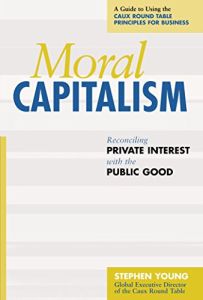Join getAbstract to access the summary!

Join getAbstract to access the summary!
Stephen Young
Moral Capitalism
Reconciling Private Interest with the Public Good
Berrett-Koehler, 2003
What's inside?
What choices face ethical capitalists? For instance, do firms owe moral allegiance to shareholders or to all of us?
Recommendation
The corporate scandals of recent years have led to much hand wringing about corporate values. Now comes Stephen Young, head of the Caux Round Table - an international network of executives focused on corporate responsibility - with simple rules for turning the hand wringing into action. Some of Young’s advice seems to be common sense: Tell the truth, for instance, and follow the law. By encouraging capitalists to go beyond following the letter of the law, Young offers a useful guide to ethical decision making. At times, though, he seems to give capitalists a free pass. For instance, Young argues that moral capitalists have little responsibility to withhold harmful products such as cigarettes and liquor from consumers who want to buy them. getAbstract.com recommends this easy-to-digest study to anyone intrigued by the ethical implications of capitalism. The book is a useful presentation of the argument that capitalism, the most powerful economic system in history, must balance might and right.
Summary
About the Author
Stephen Young is global executive director of the Caux Round Table and president of Winthrop Consulting and the Minnesota Public Policy Forum. He attended Harvard Law School and is a former assistant dean of the school. He attended high school in Thailand and is an expert on East Asia.


















Comment on this summary